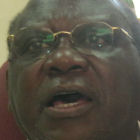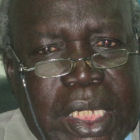By: Paul Jimbo
Send to a friend
The details you provide on this page will not be used to send unsolicited email, and will not be sold to a 3rd party. See privacy policy.
Southern Sudan is rebuilding its agricultural research from scratch, but can it attract the diaspora back to help? Paul Jimbo reports.
[JUBA, SUDAN] After the sound of gunfire fell silent in Southern Sudan, marking the end of one of Africa’s longest running civil wars, Pio Kowr Ding decided he would return home to the autonomous region to take up an agricultural research job with the government.
With a masters degree in soil and land evaluation, and experience working for the Agricultural Research Corporation’s Land and Water Research Center (LWRC) in Khartoum, Ding was keen to help the region rebuild its agricultural research. But when he arrived in 2008 he realised that the task was actually to start from scratch and the living conditions were tough.
"It is very discouraging — completely the opposite of life outside here — and it is difficult to cope," he says.
Although peace returned to Southern Sudan in 2005, several economically vital sectors in the region lag behind, even as the clock ticks towards the expiry of the five-year lifespan of the Comprehensive Peace Agreement between the north and the south.
As well as claiming 2.5 million lives, the war also drove 4 million people out of the region.
Attracting scientists back is proving tricky. A drive to lure scientists back to rebuild Southern Sudan’s agriculture has attracted just seven researchers so far.
"Those of us who found courage and returned cannot even find research equipment or facilities like the ones we had in the diaspora," says Ding. "That is why a lot of my friends and colleagues are still there."

Mukiibi: Southern Sudan has enough land to feed East Africa
Paul Jimbo
Worried by the dismal performance of the sector, Southern Sudan’s government has now looked abroad and brought in the renowned agricultural research scientist and plant pathologist, Joseph Mukiibi, the founder of Uganda’s National Agricultural Research Organisation (NARO), to run a new research institute.
The region ‘could feed East Africa’
Mukiibi, who once led NARO’s research on food crops, forestry and livestock, is now spearheading the re-establishment of a strategic agricultural research plan in Southern Sudan.
"We are to re-establish what existed before, we have to see what is on the ground, what network, which model do we want that will suit Southern Sudan best," he says.
The government needs to start training its own people, or tap cheaper labour from neighbouring areas, he says.
"This region has a population of ten million people in an area three times the size of Uganda, which has 32 million people. A lot of Southern Sudan is empty land: if the government is serious, it can start agricultural projects here that can feed the rest of East Africa."
The real key, however, is to attract scientists back because, he believes, modern agriculture cannot succeed without research. Mukiibi believes the region has an untapped seam of highly qualified nationals who continue to live abroad.
"Very few people in the diaspora would be willing to leave their plum jobs and comfortable lifestyles to come back home. You can imagine that after 20 years of war, education is limited, people and resources are just not here, and those who are coming back need some time to settle back in."
Making a start
And the working environment is indeed far from inviting. He recounts the grim state of a former research station in the town of Yei.
"I can tell you it’s empty, in a sorrowful state. There is a lab but it is in darkness. There is nobody and no research equipment, just some dilapidated staff houses, which are empty," Mukiibi says.
"Can you imagine someone in the diaspora who has a fully functioning lab with running tap water and electricity? And you’re telling him to come to the bush where there is no power, and where he can run out of water and not even have a pit latrine?"
Many Sudanese scientists are proud of their nation but that is not enough. "They cannot eat nationalism," Mukiibi says.
"Human resources are limited but we will start with what we have. We will start small, with one centre, make it functional and, with the experience we get there, we will move to the next centre, learning from mistakes and strengths. We will ultimately build the system."
Foreign input, indigenous priority
Mukiibi compares the Southern Sudanese experience to that of Rwanda after its civil war and genocide in the early 1990s. The Rwandans "opened up and got people from Uganda and Kenya even as they returned to be trained to take over the operations of their research institutes", he says.
His team is now developing the strategic research plan, which must be completed by March 2011. It will be based on that of Kenya’s Agricultural Research Institute (KARI) and Uganda’s NARO, and it will be put out for discussion with stakeholders at every step — "that way, you have many chances of having it implemented".
Other than Mukiibi and Ding, the team comprises a plant breeder, an entomologist, a horticulturalist and an agronomist, all of them Southern Sudanese who have returned since the war ended.



Lugor: Emphasis should be on indigenous crops
FlickrUnited Nations Photo
Loro George Leju Lugor, director general of research, training and extension services at Southern Sudan’s agriculture and forestry ministry, makes these points about the plan:
"First, we do not want to rely on imported seeds year in, year out. Second, we want to upgrade our national germplasm of indigenous crops. And third, we want to improve crop production technology for our own consumption and export."
He says the emphasis should be on indigenous crops in the region’s six agro-ecological zones: green belt, iron-stone plateau, flat plains, Nile-Sobat River, hills and mountains, and semi-arid areas.
Moving into production
At the newly established research unit, Lugor says that seed production and the creation of a database of all locally grown crops will be a priority.
"We are distributing seeds proven to do very well in the agro-ecological zones after importing them from Uganda and Kenya," Lugor says.
"The production of our own, locally bred seeds, and their distribution to farmers is not something we can do within a year: it will take two to three years to be fully established due to the many challenges involved in conducting research work in the situation we have in Southern Sudan," he concedes.
Like Mukiibi, Lugor says challenges range from financial constraints, the diversity of the country, and lack of infrastructure and manpower.
Without returning professionals, he says, the region lacks the "think tanks" needed to plan and execute agricultural research work.
"We are making proposals to international research organisations and bilateral partners but it’s not easy to get the money needed. For example, we budgeted for US$56 million but have received a small fraction of this, so we are prioritising the crops and seeds we need to produce and develop."
A number of non-governmental organisations and bilateral partners including the Dutch government, the UN Food and Agricultural Organisation, and World Bank and the US Agency for International Development partners have offered to assist in the research, says Lugor.
Others that have expressed interest, he adds, include international research organisations such as KARI, the International Livestock Research Institute in Kenya, the Association for Strengthening Agricultural Research in Eastern and Central Africa, in Uganda, the International Crops Research Institute for the Semi-Arid Tropics, in Kenya, and the Kenya Forestry Research Institute.
The seven researchers who have made it home no doubt await these developments with great interest.













